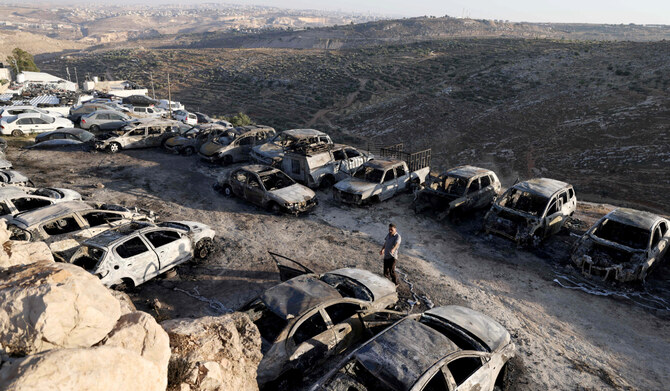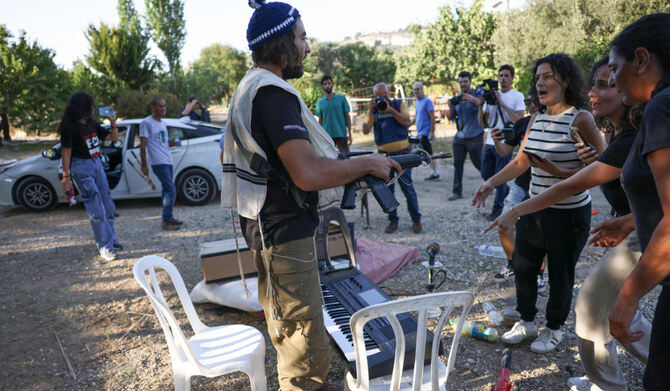RAHAT, Israel: Lamis Al-Jaar says she can hardly sleep at night after hard-line Jewish settlers violently assaulted her and four other members of her Israeli Bedouin family, sparking outcry across the country.
On August 9, the 22-year-old got lost while driving with her young daughter, two sisters and a niece from the Bedouin city of Rahat in southern Israel toward Nablus, a large Palestinian city in the occupied West Bank.
The women say that when they asked a man for directions, they unwittingly set in motion what Israeli police would later describe as a “serious attack” — one that heightened concerns about rising settler violence and spurred an outpouring of support for the family.
The man they approached sent them down the wrong road, then blocked their car when they tried to turn around, allowing a dozen assailants to descend on the vehicle, throwing stones and brandishing weapons.
Lamis, a teacher’s aide in a kindergarten, was certain she was going to die. She told AFP how one of the men threatened her daughter Elaf, just two and a half years old, “with the barrel” of his firearm.
Her sister Raghda Al-Jaar, a 29-year-old assistant in a dentist’s office, said the men shattered the car windows and sprayed its occupants with tear gas.
“I said... that we were Israeli citizens,” Raghda recounted, but when one of the men realized she was calling the police he threw a rock at her and shouted: “You will not leave here alive!“
Despite being outnumbered, the group managed to flee and were eventually rescued by Israeli police and soldiers.
Police said they had “accidentally entered” Givat Ronen, an outpost of the Jewish settlement of Har Bracha, south of Nablus.
The area is run by members of the so-called hilltop youth, religious nationalists who dream of settling all the biblical land of Israel, and who sometimes also clash with Israeli security forces.
Israel’s Bedouins are descendants of Muslim shepherds who once roamed freely across desert expanses far beyond the country’s current borders.
Like other Arab minorities in Israel, they often complain of discrimination.
Rahat, where the Al-Jaar family lives, is home to one of the biggest concentrations of Bedouins.
During the interview with AFP, which took place at the home of their father Adnan Al-Jaar, Lamis and Raghda described their injuries: fractured fingers and back pain for Lamis and a head injury for Raghda, whose left leg is also in a cast.
Two days after the attack, Israeli President Isaac Herzog called Adnan Al-Jaar to tell him he was “shocked” by the violence and that “all citizens of Israel deserve equal and decent treatment,” his office said.
Adnan Al-Jaar, a 59-year-old truck driver who like his daughters switches easily between Hebrew and Arabic, told AFP such outreach “makes us feel good,” even though he fears the crime, like other instances of violence, could go unpunished.
The police have so far announced the arrest of five suspects, four of whom remain in custody while the fifth is under house arrest.
The attack against the Al-Jaars occurred against the backdrop of worsening violence in the West Bank.
Israeli settlements in the territory are illegal under international law, and the United Nations considers them an obstacle to peace with Palestinians.
But settlements have grown under all governments, both left and right, after Israel occupied the West Bank in 1967, and they have increased significantly since the formation in December 2022 of Prime Minister Benjamin Netanyahu’s current government.
Netanyahu appointed several far-right ministers who support the annexation of the entire West Bank, an agenda they have pursued even more aggressively since the outbreak of war between Israel and Hamas in the Gaza Strip on October 7.
The violence meted out to the Al-Jaars nevertheless appears to have shaken Israel, and myriad voices have denounced it.
Center-right opposition lawmaker Matan Kahana visited the Al-Jaar home to show solidarity, saying he was “reassured that the majority of the Israeli people condemn this act.”
Rabbi Benny Lau, known as a moderate Orthodox figure, posted a photo on Facebook of his meeting with Adnan Al-Jaar, accompanied by a message emphasising the aspirations of “the millions... who want to live together.”
Amit Segal, a television personality known for his right-wing views, condemned the remarks of a far-right parliamentarian whom he accused of colluding with “supporters of terrorism” by trying to shift blame for the August 9 attack onto the victims.
Ordinary Israelis have also spoken out.
Noa Epstein Tennenhaus, 41, recently drove an hour and a half with her husband and their four children to present a toy to young Elaf.
“I cried” upon learning of the attack, she told AFP.
“I imagined being in the position of Lamis in the car and being attacked by these monsters.”
“Blind hatred is going to get us all killed in the end if we don’t stand up to it,” she added.



























